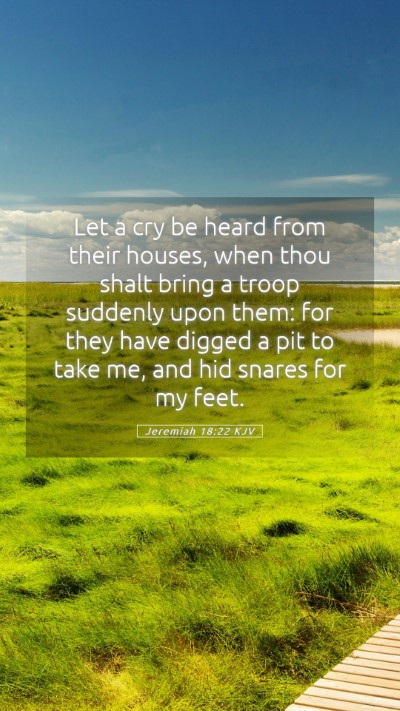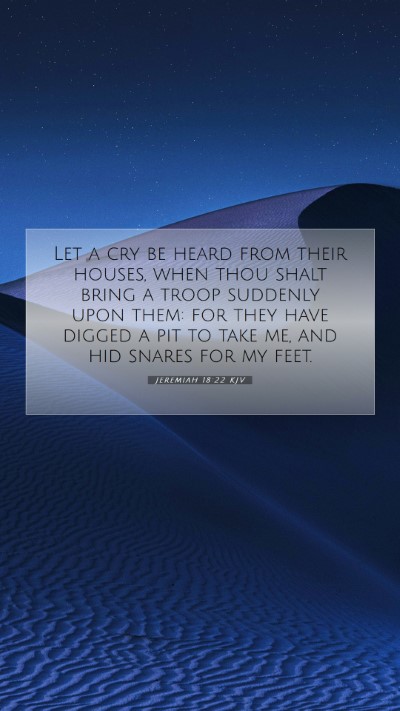Understanding Jeremiah 18:22 - A Comprehensive Bible Verse Commentary
Jeremiah 18:22 states: "Let a cry be heard from their houses, when you bring the troop suddenly upon them; for they have dug a pit to take me, and hid snares for my feet." This verse comes from a profound narrative where the prophet Jeremiah articulates the impending judgment and calamity awaiting those who oppose God's will. It encapsulates a deep sense of betrayal and the urgency for God’s people to heed His warnings.
Contextual Background
In understanding this verse, it is crucial to consider the broader context of Jeremiah's message. The prophet warns the inhabitants of Judah about the consequences of their sins, including idolatry and injustice. His role is not merely to predict doom but to call the people to repentance and awareness of their actions.
Key Insights from Public Domain Commentaries
-
Matthew Henry's Commentary:
Matthew Henry highlights the personal anguish of Jeremiah as he experiences the plots against him. He interprets the "cry" as a reflection of the profound desperation that will ensue when judgment falls, indicating both the seriousness of sin and the inevitability of divine justice.
-
Albert Barnes' Notes on the Bible:
Barnes provides an interpretation that points towards the consequences of human actions, particularly how the wicked schemes they devise for others ultimately ensnare themselves. This speaks to the broader biblical theme of reaping what one sows and the justice of God in ensuring that those who plot against His messengers face repercussions.
-
Adam Clarke's Commentary:
Clarke discusses the implications of the "troop" or army that is to come suddenly, demonstrating that divine judgment can arrive unexpectedly. He emphasizes the prophetic nature of Jeremiah’s words, which serve as a warning and a call to repentance for those who choose to reject God’s ways.
Thematic Elements
The themes inherent in Jeremiah 18:22 include the reality of divine retribution, the earnestness of prayer amidst calamity, and the prophetic role of warning against sinful practices. This verse can evoke reflections on how communities and individuals may unintentionally set traps for themselves through their actions.
Spiritual Application
For modern readers, applying the meanings of this scripture can lead to significant introspection. It challenges us to evaluate our intentions and actions towards others and consider the spiritual traps we might be setting for ourselves in our lives.
Cross References
- Proverbs 26:27: "Whoever digs a pit will fall into it; if someone rolls a stone, it will roll back on them." This parallels the theme of self-inflicted consequences.
- Galatians 6:7: "Do not be deceived: God cannot be mocked. A man reaps what he sows." This emphasizes the biblical principle of reaping and sowing.
- Psalm 7:15: "He who digs a hole and scoops it out falls into the pit he has made." This reiterates the return of evil upon those who intend it for others.
Conclusion
Jeremiah 18:22 serves as a poignant reminder of God's justice and the serious call to individuals and communities to reflect on their actions. By studying such verses and understanding their implications, we can achieve deeper insights into Scripture and apply its teachings to our lives. Whether in personal study or within Bible study groups, this verse and its interpretations spark critical discussions on moral integrity and the nature of divine response to human behavior.


